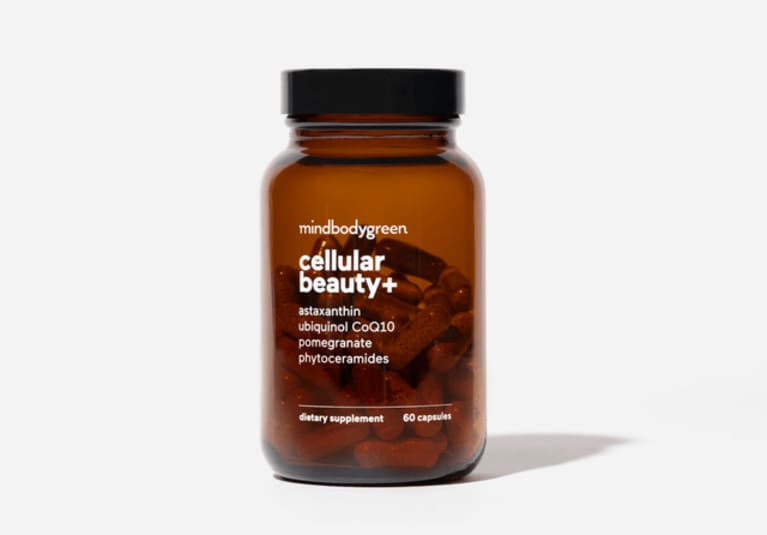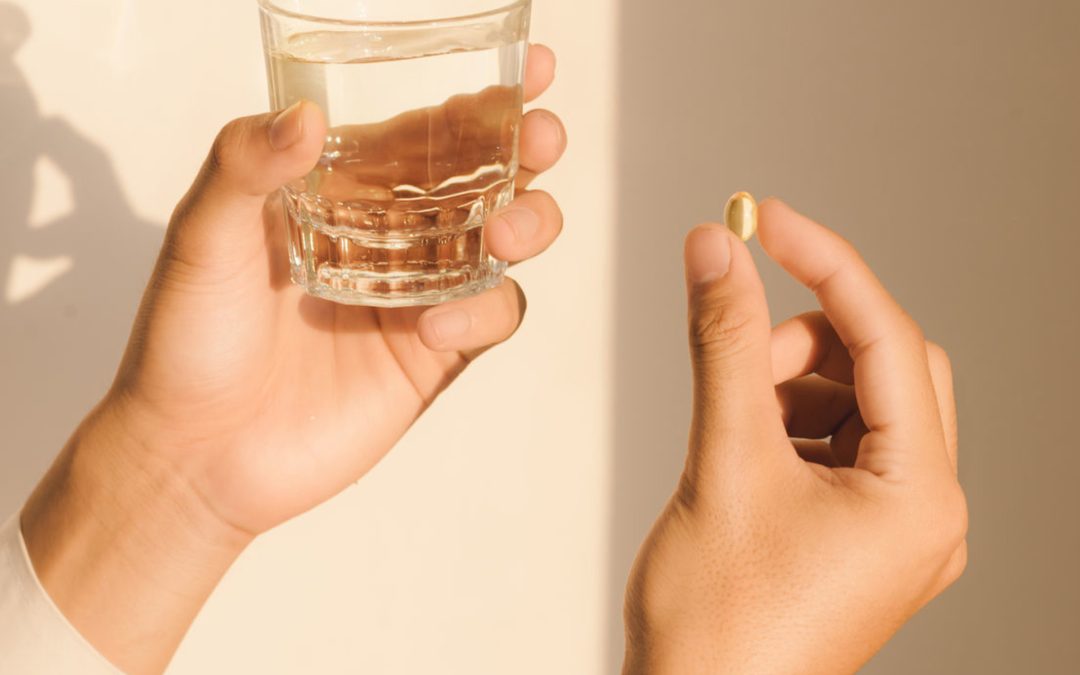
Our editors have independently chosen the products listed on this page. If you purchase something mentioned in this article, we may earn a small commission.
September 24, 2022 — 10:29 AM
Nutrients and special bioactives cycle through their time in the spotlight. One current buzzy antioxidant is CoQ10, in long form known as coenzyme Q10. This powerful coenzyme compound is found in skin care formulas and other targeted supplements—CoQ10 is multidimensional and sought after for a very good reason. However, ingesting CoQ10 provides different benefits than applying it topically. But how much CoQ10 should you take each day to reap said benefits? Here’s the answer.
CoQ10 is a fat-soluble bioactive compound that’s found in your cells. “It’s so important, in fact, that CoQ10 is found ubiquitously in your mitochondria, the energy powerhouse organelles in every cell of your body, in order to produce ATP from the nutrition we consume,” explains nutrition scientist Ashley Jordan Ferira, Ph.D, RDN.
As a “co” enzyme, this vitamin-like quinone enhances the function of other enzymes (i.e., specialized proteins that catalyze biochemical reactions in every cell) in the body.
In addition to playing a critical role in cellular energy production, CoQ10 also functions as a versatile, lipid-soluble antioxidant, supporting cellular health throughout the body, including those involved in skin health.
For example, “three months of daily CoQ10 supplementation (at 50 and 150 mg doses) has been shown in clinical research to smooth skin and reduce fine lines and wrinkles,”* shares Ferira.
Because of its omnipresence in our physiology, CoQ10 plays a larger role in full-body benefits, including heart health support. In one study, participants who consumed 100 milligrams of CoQ10 three times daily for two years had improved markers of cardiovascular health.*
“Fascinatingly, CoQ10 resides in the most concentrated amounts in our most metabolically active, or busy, organs—like our heart, kidneys, and liver,” Ferira adds.
And the benefits of supplementing with CoQ10 don’t stop there. For a deep dive into the rest, including brain health and fertility support, check out this CoQ10 breakdown.*
In most supplements, registered dietitian Ginger Hultin M.S., RDN, CSO, says the most common dose is 100 to 200 milligrams, although the range of potencies seen in the scientific literature and market are certainly wider than this.
Ultimately, the concentration of CoQ10 you need depends on what the available scientific literature says, your personalized health situation and goals with CoQ10, and what other supplements you’re taking.
cellular beauty+
A revolutionary, science-backed cosmeceutical*

Because CoQ10 is not an actual nutrient (e.g., macro- or micronutrient), there isn’t a set recommended intake or daily nutritional requirement established. “That means you’ll need to work with your healthcare team (usually your doctor and/or registered dietitian) who will use research to determine what may be best for you,” Hultin tells mbg.
If you’re pregnant or plan on becoming pregnant, Hultin suggests meeting with a health care professional such as a dietitian before consuming any supplements. However, “For pregnancy, the research is more limited, though some studies do show that it can be safe,” Hultin says about CoQ10 supplementation.
Can you take too much CoQ10?
Theoretically, you can take too much of any nutrient or compound, whether in food, beverage, or supplement form. “But the good news is that for CoQ10, there doesn’t seem to be a high risk of toxicity with higher intakes,” Hultin says. However, it’s still best to meet with your medical team before selecting a higher-than-average dose of CoQ10.
“Preclinical and clinical research indicates that in supplement form CoQ10 has a wide margin of safety and low potential for toxicity, with an acceptable daily intake level established as high as 12 milligrams per kilogram of body weight per day,” explains Ferira.
“To put that in further context: That’s over 700 milligrams of CoQ10 daily for a person who weighs 140 pounds. And while almost no one is consuming that amount, nor could afford it, that’s a comforting safety margin,” Ferira adds.
“Keep in mind that there are some potential drug/nutrient interactions with CoQ10 including with blood thinners or some chemotherapy drugs, so be sure to discuss all dietary supplement use with your medical team,” Hultin says. It’s better to be safe than sorry—which is why anyone with specific health considerations should partner with their doctor when expanding their targeted nutrition regimen with supplements.
Like many nutritional compounds, CoQ10 can be found in both food and in supplements. Here, some common foods rich in CoQ10, according to Hultin:
- Beef
- Pork
- Lamb
- Sardines
- Chicken
- Broccoli
- Oranges
- Strawberries
- Lentils
- Soybeans
- Sesame seeds
- Pistachios
As you can see, there are more than a few ways to sneak CoQ10 into your diet. But if you want to take the guesswork out of getting your daily dose, you may opt for a formulated, high-quality supplement as well. This is particularly true when you’re attempting to consume a specific dose of CoQ10 in a particular format daily or routinely.
Quick note: CoQ10 and coenzyme Q10 are synonymous, but form in which it’s delivered will vary, so check the product info and label. It should specify ubiquinol or ubiquinone.
For reference: Ubiquinol (as found in mbg’s cellular beauty+) is the most bioavailable and bioactive form, accounting for 90% of the CoQ10 in the blood. In the world of CoQ10 supplements, ubiquinone is a cheaper option because it’s less premium in its composition. It must be converted to ubiquinol in the body before it’s able to be utilized. So if you’re on the hunt for a CoQ10 supplement, remember to keep an eye out for this key distinction.
CoQ10 has gained popularity thanks to its multidimensional efficacy, from targeted supplement formulas to skincare topicals. This antioxidant and essential cellular energy coenzyme has a lengthy list of benefits when ingested, including brain, skin, and heart health support.* If you want to learn more about the difference between topical and oral CoQ10, as well as our A+ picks for both, check out our full guide.
If you are pregnant, breastfeeding, or taking medications, consult with your doctor before starting a supplement routine. It is always optimal to consult with a health care provider when considering what supplements are right for you.

cellular beauty+
A revolutionary, science-backed cosmeceutical*
cellular beauty+
A revolutionary, science-backed cosmeceutical*


